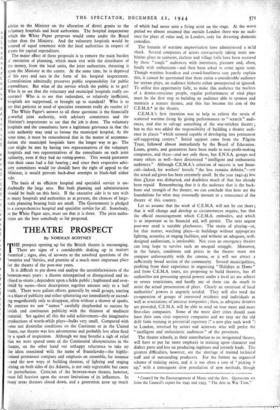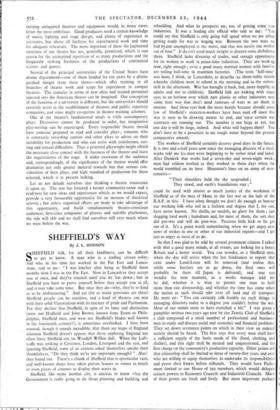THEATRE PROSPECT
By NORMAN SCOTNEY
THE prospect opening up for the British theatre is encouraging. There are signs of a considerable shaking up in matters theatrical ; signs, also, of answers to the unsolved questions of the 'twenties and 'thirties, and promise of a much more important place for the theatre of the post-war years.
It is difficult to pin down and analyse the unsatisfactoriness of the between-wars years : a theatre misorganised or disorganised and in- clined to stunts ; dependent upon a fickle public ; haphazard and over- thnid by turns—these descriptions together amount only to a half truth. There were gallant efforts, generally by small groups, starting in a blaze of publicity and either spluttering out immediately or ascend- ing magnificently only to disappear, often without a shower of sparks. By contrast we saw " names " carefully shepherded to success by lavish and continuous publicity with the thinnest of mediocre material. Set against all this the solid achievement—the imaginative productions of worth-while plays—bulks very small. Compared with tome not dissimilar conditions on the Continent or in the United States, our theatre was less adventurous and probably less often fired by a spark of inspiration. Although we may breathe a sigh of relief that .we were spared some of the Continental idiosyncrasies in the theatre, on the other hand our unhappy reluctance to take up the ideas associated with the name of Stanislaysky—the highly- trained permanent company and emphasis on ensemble, for instance —and the new ways of building theatres, of lighting and staging arising on both sides of the Atlantic, is not only regrettable but cause for perturbation. Criticism of the between-wars theatre, however, must fall heaviest upon the severe limitations of its influences. In many areas theatres closed down, and a generation grew up much
of which had never seen a living actor on the stage. At the worst period we almost assumed that outside London there was no audi- ence for plays of value and, in London, only for diverting domestic comedies.
The hazards of wartime improvisation have administered a mild shock. Several companies of actors courageously taking more am- bitious plays to canteens, shelters and village halls have been received by these " tough " audiences with intentness, pleasure and, often, finally with enthusiasm—and then been asked to come again soon. Though wartime boredom and crowd-loneliness may partly explain this, it cannot be questioned that there exists a considerable audience for serious plays, an audience hitherto either unsuspected or ignored. To utilise this opportunity fully, to make this audience the nucleus of a drarria-conscious people, regular performances of vital plays must be the first step to building an audience able to sponsor and maintain a mature theatre, and this has become the aim of the C.E.M.A.* in the theatre.
C.E.M.A.'s first intention was to help to relieve the strain of scattered wartime living by giving performances to " scratch " audi- ences, and also to salvage something of the war-stricken theatre ; but to this was added the responsibility of building a theatre audi- ence in places " which seemed capable of developing into permanent self-supporting centres." Initial support came from the Pilgrim Trust, followed almost immediately by the Board of Education. Loans, grants, and guarantees have been made to non-profit-making companies, and these—and not only these, but E.N.S.A. groups and many others as well—have discovered " intelligent and enthusiastic audiences." Although C.E.M.A.'s criterion of success is not finan- cial—indeed, for workers' hostels " the loss remains definite,"—yet the actual aid given has been extremely small. In the year 1942-43 less than £8,000 was disbursed, and doubtless much of that has already been repaid. Remembering that it is the audience that is the back- bone and strength of the theatre, we can conclude that here are the foundations for what may eventually amount to a renascence of the theatre of this country.
Let us assume that the work of C.E.M.A. will not be cut short ; that it will change and develop as circumstances require, but that the official encouragement which C.E.M.A. embodies, and which is as important as its financial aid, will persist. The next urgent post-war need is suitable playhouses. The strain of playing—or, for that matter, watching plays—in buildings without appropriate lighting, acoustics or staging facilities, and without an adequate, well- designed auditorium, is intolerable. Not even an emergency theatre can long hope to survive such an unequal struggle. Moreover, in the future, conditions and prices in the theatre must not compare unfavourably with the cinema, or it will not attract a sufficiently broad section of the community. Several municipalities, profiting from their experience in organising "Holidays at Home" and from C.E.M.A. tours, are proposing to build theatres, but all authorities not possessing special powers under a local act are subject to severe restrictions, and hardly any of them can do much to assist the actual presentation of plays. Clearly an extension of local authorities' powers is urgently needed. They will also need the co-operation of groups of interested residents and individuals as well as associations of-amateur companies ; then, as adequate theatres are provided, C.E.M.A. will be able to send on tour more and more first-class companies. Some of the more alert cities should soon have their own civic repertory companies and we may see the old drift from training in provincial repertory (" a new play each week ") to London, reversed by actors and actresses who will prefer the " intelligent and enthusiastic audiences " of the provinces.
The theatre schools, as their contribution to an invigorated theatre, will have to put far more emphasis in training upon character and dialect parts and less on producing ingénues and juvenile leads. The greatest difficulties, however, are the shortage of trained technical staff and of outstanding producers. For the former no organised scheme of training exists, and it is too often a case of " picking it up," with a consequent slow percolation of new methods, though
* Council for the Encouragement of Music and the Arts. Quotations are from the Council's report for 1942 and 1943, "The AA, in War Time."
existing antiquated theatres and equipment would, in many cases, fetter the most ambitious. Good producers need a certain knowledge of music, lighting and stage design, and plenty of experience as assistants, but above all facilities for experimental work and time for adequate rehearsals. The more important of these the haphazard structure of our theatre has not, generally, permitted, which is one reason for the uninspired repetition of so many productions and the frequently striking freshness of the productions of continental visitors and guests.
Several of the principal universities of the United States have drama departments—one of them headed for ten years by a distin- guished émigré from these shores—which offer training in all branches of theatre work and scope for experiment in campus, theatres. The stimulus in terms of new ideas and trained personnel injected into the American theatre can be imagined. Our conception of the function of a university is different, but the universities should certainly assist in the establishment of theatres and public repertory companies, and some might co-operate in theatre training schemes.
One of the theatre's fundamental needs is virile contemporary plays. Dramatists cannot be produced to order, but imaginative play-writing can be .encouraged. Every responsible theatre should have someone prepared to read and consider plays ; someone who is constantly reviewing current and other plays to advise on their suitability for production and who can assist with translations, cut- ting and textual difficulties. Thus a potential playwright might obtain the necessary close contact with the business of the theatre and learn the requirements of the stage. A wider extension of the audience and, correspondingly, of the significance of the theatre would offer dramatists not only greater material rewards but that serious con- sideration of their plays, and high standard of production for those selected, which is at present lacking.
Let us not delude ourselves into thinking a theatre renascence is upon us. The war has fostered a keener community-sense and a ,readiness for new ideas and experiences which, as we would expect, provide a very favourable opportunity for an increase of theatrical activity ; but unless organised efforts are made to take advantage of this opportunity, and build simultaneously theatre-conscious audiences, first-class companies of players and suitable playhouses, the tide will ebb and we shall find ourselves still very much where we were before the war.



























 Previous page
Previous page